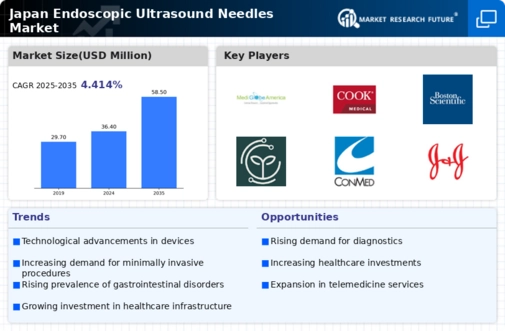Growing Aging Population
Japan's demographic shift towards an aging population is a significant driver for the endoscopic ultrasound-needles market. With approximately 28% of the population aged 65 and older, there is an increasing need for medical interventions that cater to age-related health issues, including cancers and chronic gastrointestinal conditions. This demographic trend suggests a higher demand for diagnostic procedures that utilize endoscopic ultrasound-needles, as older adults often require more frequent medical evaluations. The healthcare system is adapting to these needs by integrating advanced diagnostic tools, thereby propelling the growth of the endoscopic ultrasound-needles market. As the population continues to age, the market is likely to see sustained demand, reflecting the necessity for effective and timely medical interventions.
Rising Healthcare Expenditure
The increase in healthcare expenditure in Japan is positively impacting the endoscopic ultrasound-needles market. With the government and private sectors investing more in healthcare infrastructure, there is a growing emphasis on advanced diagnostic technologies. Recent reports indicate that healthcare spending in Japan has risen by approximately 5% annually, reflecting a commitment to improving patient care. This financial support enables healthcare facilities to acquire cutting-edge equipment, including endoscopic ultrasound-needles, which are essential for accurate diagnostics. As hospitals and clinics enhance their capabilities, the demand for these specialized needles is expected to grow, indicating a favorable environment for market expansion. The trend suggests that increased investment in healthcare will continue to drive the endoscopic ultrasound-needles market forward.
Advancements in Medical Technology
Technological innovations in the medical field are significantly influencing the endoscopic ultrasound-needles market. The introduction of high-definition imaging and improved needle designs enhances the accuracy and efficacy of procedures. For instance, the development of fine-needle aspiration (FNA) techniques has improved diagnostic yield rates, which are reported to be as high as 90% in certain cases. These advancements not only facilitate better patient outcomes but also encourage healthcare facilities to adopt the latest technologies. As hospitals and clinics in Japan invest in state-of-the-art equipment, the demand for advanced endoscopic ultrasound-needles is expected to rise. This trend indicates a robust growth trajectory for the market, as healthcare providers prioritize precision and efficiency in their diagnostic processes.
Increasing Prevalence of Gastrointestinal Disorders
The rising incidence of gastrointestinal disorders in Japan is a crucial driver for the endoscopic ultrasound-needles market. Conditions such as pancreatitis, gastrointestinal cancers, and inflammatory bowel diseases are becoming more prevalent, necessitating advanced diagnostic tools. According to recent health statistics, the prevalence of these disorders has increased by approximately 15% over the last decade. This trend underscores the need for effective diagnostic procedures, where endoscopic ultrasound-needles play a vital role. As healthcare providers seek to enhance patient outcomes, the demand for these specialized needles is likely to grow, reflecting a shift towards more precise and less invasive diagnostic techniques. Consequently, the endoscopic ultrasound-needles market is expected to expand significantly, driven by the need for improved diagnostic capabilities in managing gastrointestinal health.
Enhanced Training and Education for Healthcare Professionals
The focus on improving training and education for healthcare professionals in Japan is a vital driver for the endoscopic ultrasound-needles market. As medical practitioners become more skilled in using advanced diagnostic tools, the adoption of endoscopic ultrasound-needles is likely to increase. Educational programs and workshops aimed at enhancing procedural skills are being implemented across various medical institutions. This emphasis on training not only improves the proficiency of healthcare providers but also boosts confidence in utilizing these advanced techniques. Consequently, as more professionals become adept at performing procedures with endoscopic ultrasound-needles, the market is expected to experience growth. This trend highlights the importance of continuous education in fostering innovation and improving patient care in the healthcare sector.






















Leave a Comment